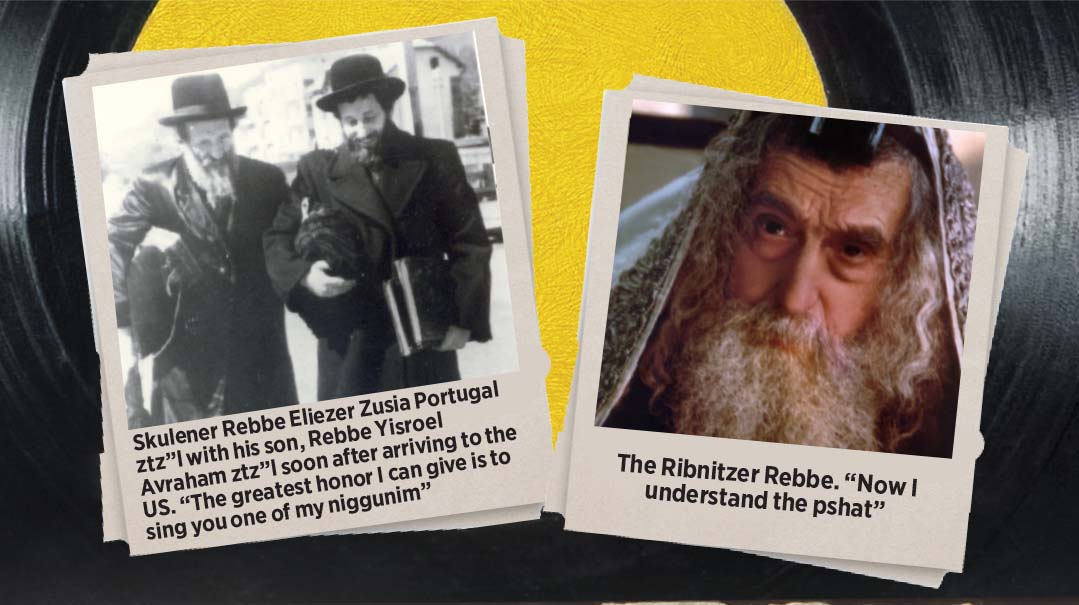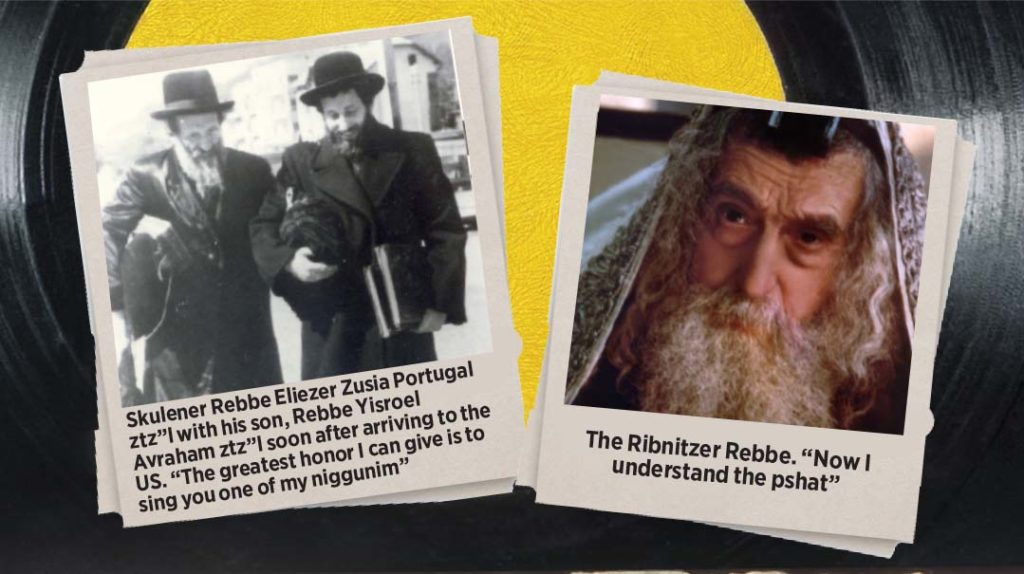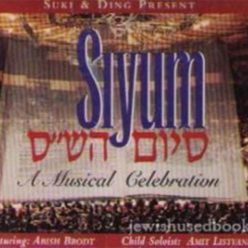"To me, the greatest honor I can give you is to sing to you one of my beloved niggunim”

Ihear a lot of stories in my line of work, but every once in a while, I’m privy to some story that touches my soul and I can’t get it out of my mind. I heard the following from the Liminover Rebbe, Rav Yaakov Shlomo Meisels, who witnessed the following encounter.
The story took place in Seagate, Brooklyn, in 1980 during the short period that the Ribnitzer Rebbe, Rav Chaim Zanvil Abramowitz ztz”l lived there. The Skulener Rebbe, Rav Eliezer Zusa Portugal ztz”l, was coming to visit Seagate for a short vacation. When the Ribnitzer Rebbe was told that the Skulener Rebbe would be visiting, he asked that a message be sent over to him that he would be coming over to visit. Their relationship went way back to the time that the two of them learned together in Russia many years before. When they met, they happily embraced each other like long-lost brothers.
After they sat down together, the Skulener Rebbe said, “Reb Chaim Zanvil, you are honoring me so greatly by coming over — it means the world to me. I have prepared the biggest kibbud that I can think of for you, in honor of your visit.” The Ribnitzer Rebbe looked around him and replied, “Lazer Zusha, the table is bare, there’s only a sefer lying next to you.” The Skulener replied, “I prepared an honor much greater than a feast. To me, the greatest honor I can give you is to sing to you one of my beloved niggunim.”
This was a new idea to the Ribnitzer, and, true to his word, the Skulener Rebbe, who composed hundreds of niggunim, started to sing his song “Z’chor Davar” — a niggun most people are familiar with today. When he reached the high part, he sang with extra gusto, really pouring all his emotion into it. After hearing the song, the Ribnitzer Rebbe, who really enjoyed it, asked him, “Is this really your niggun?” “Of course!” replied the Skulener. “Seriously?” asked the Ribnitzer Rebbe. “You yourself made this niggun?” The Skulener assured him that he, in fact, did compose it. Replied the Ribnitzer Rebbe, “Lazer Zusha, let me ask you something. The song is beautiful. But don’t you have more important things to do than to make up niggunim?”
The Skulener Rebbe smiled and replied; “Chaim Zanvil, my friend, I see you don’t understand. I don’t write songs. I write vertlach — peirush on the pshat.”
“Then I’m afraid I don’t understand the pshat,” replied the Ribnitzer Rebbe.
“How about if I explain it in words?” asked the Skulener.
“Please!” replied the Ribnitzer Rebbe.
Said the Skulener Rebbe, “We live in very dangerous times today. Yiddishkeit is at stake. In this generation, it becomes harder and harder to raise yerei Shamayim, good children who have steadfast emunah. And do you know what the problem is? The weaker children in the streets, the children who have nebach fallen from their esteemed perches, approach our precious talmidim and mock them. They say, ‘You’re still trying to live your life like your father and grandfather did? Well, you can’t! Times have changed! And you must change with it! The Torah was written for the older generation! Not for us! We must adapt it to reflect our times!’
“And, slowly but surely, when our boys give in, just a little, to the pressures of this new generation, that is the beginning of the end. They fall completely away. It’s tragic. And this is what the pshat of my song is. Zeidim helitzuni. The people in the street make a mockery of us. They call our way of life ‘leitzanus,’ a joke. Ad me’od, It’s too much, they say. You expect too much! And I answer them, ‘No! It’s miTorascha lo natisi! From Hashem’s Torah, I will not turn away, even a drop! I will follow it word for word, just like our esteemed grandparents!’ So now let me sing it again for you.”
When the Ribnitzer Rebbe heard this, he couldn’t control himself. He jumped up and said, “Wow! This is holy! What a beautiful pshat.” And these two tzaddikim sang the song together.
After I heard this heartwarming story, I went into my car and pulled up an old recording of Reb Dovid Werdyger a”h singing “Z’chor Davar.” Now, it was no longer just words from Tehillim, but a very deep and powerful pshat. When you’re in this business, it’s so special when you realize how holy a song can actually be.
(Originally featured in Mishpacha, Issue 881)




